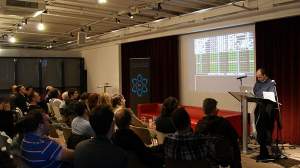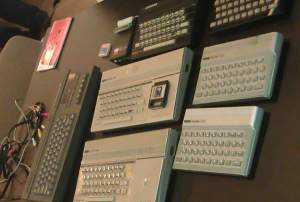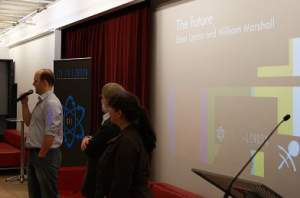
After a musical performance inspired by classic computers and gaming from MJ Hibbett, the first talk on day one was from Bletchley Park tour guide PJ Evans who lead the audience through a whirlwind tour of the Spectrum’s family tree, focusing on how the British computer industry grew from Colossus; the first programmable electronic digital machine created in 1943 which has been lovingly rebuilt over 15 years by volunteers at the National Museum of Computing. After admitting that very few photos exist of the original Colossus, it was interesting that next on the programme was Digital Archaeologist Steven Goodwin who delivered a well humoured yet important talk about preserving our computer legacy with some good advice on how to back up work. Reminding everyone that “It’s not that no computer innovation took place in the 1980s, just that none of it was recorded”, attendees set to documenting the event on Twitter and Facebook, capturing the positive, genuinely warm-hearted mood and impressions of the day, sharing their memories, photos and generally geeking out.

Day two continued the Spectrum celebrations with journalist Rupert Goodwins getting the audience laughing as he explained how he was unexpectedly employed by Sinclair after a chance meeting at a dinner party - though part of his job was really to spy on Acorn and that after putting two batteries in it, he could hit 60 MPH in a C5 around a car park! Chris Smith then took everyone to the depths of coding as part of his Harlequin project. He explained how he has rebuilt a Spectrum from scratch after redrawing the architecture across 20 pages of A3, using over 3000 transistors, 1000 gates and through sourcing as many original components as he could. He also revealed that the original Spectrum would never have been born if a microscopic fleck of dust hadn’t found its resting place in the EXACT spot where there was a broken connection on one of the ULA chips.

Then the Pi arrived…
Following the rise of the home PC and games consoles, dwindling numbers of students, or students with only a basic grasp of programming have been taking up programming courses as the art of tinkering about with computers and learning how to code has almost been lost. Working with his colleagues at the University of Cambridge’s Computer Laboratory, Eben Upton has set to turn the tides with the creation of the Raspberry Pi. A credit-card sized (86mm x 54mm x 17mm) computer weighing only 45g, the R-Pi plugs into a TV and keyboard and is capable of running desktop jobs like spread sheets, word-processing and games plus can play high-definition video. There are currently two models available; Model A has 256Mb RAM and a USB port whilst Model B has 256Mb RAM, 2 USB ports and an Ethernet port. Demand for the R-Pi has gone wild as each model costs under $30! We sat down with Eben before his presentation to hear more:
SFL: Welcome to Sci-Fi-London Eben. Clearly there are a lot of people here who are excited about getting a glimpse of the new Raspberry Pi. Are you surprised at the reaction it’s had?
Eben Upton: Yes! I mean, obviously, we hoped it would be well received and we’re thrilled at the response but it’s beyond what we expected.
SFL: What is the current demand for the Raspberry Pi?
Eben: Well, the first batch to be sent out was 7,000 and we’re about to ship out another 4,000 as batch two with the view to ship at least 120,000 by the end of June, but expressions of interest was around 350,000 last time I checked and that’s based on rationing to one per person. Obviously these are cheap enough that a lot of people don’t just want one, they want two or three or ten. Those people that want to buy them for a class currently can’t and that’s a priority for us to sort out.
SFL: You created this because you wanted to get kids back into programming and make it so that it would only take a few weeks of saving up pocket money or cheap enough that parents would be more inclined to buy for their kids. What do you think about people who are already familiar with programming and are buying into Raspberry Pi for the nostalgia?
Eben: Fairly early on, we realised the initial ones weren’t going to sell to kids because they don’t know about it yet! We need to see some work done to make it suitable for the very entry level. We need to have that smooth fill from being ‘hello world’ to becoming a professional software engineer. There’s a programme called ‘Scratch’ which has been developed at M.I.T. which is good for very young kids aged 6 or 7 and these are the sort of tools we’d like to get working on the platform. People buying the Pi for nostalgic reasons is an indirect route to our destination but that’s a good thing. That was the one thing we did underestimate, just how much enthusiasm there would be around the world. There are genuinely millions of people who have this memory of a time when we had programmable hardware, and that still come together to celebrate that, like this event today.
SFL: A lot of what has been shared at this event has been from the programming aspect and what lies inside the Spectrum. Was the design of the Raspberry Pi the most important thing to you or was it the potential of what it can do?
Eben: Wouldn’t it be awesome if in 30 years time, we were in a room celebrating the Pi? I think we have a real chance to accomplish our goal, given that our goal is to get more kids into programming, into college, into the workforce and we really hope people will look back fondly on what we're trying to achieve. They might not meet up in a room… But yes, it’s exciting to think what might happen. The next step is to make it appeal more to kids, make them want to pick this up rather than ignoring it in favour of their iPhones. I think we should be looking at including some content on there, maybe some games.
SFL: Finally, speaking of games, what’s your favourite game?
Eben: I’ve been playing Journey recently and it’s extremely good. I’ve just finished it. Amazing in fact.

Huge thanks to Paul Squires and Leila Johnston from Imperica for all the work they put into the Horizons event and to everyone who came and made this a real celebration!